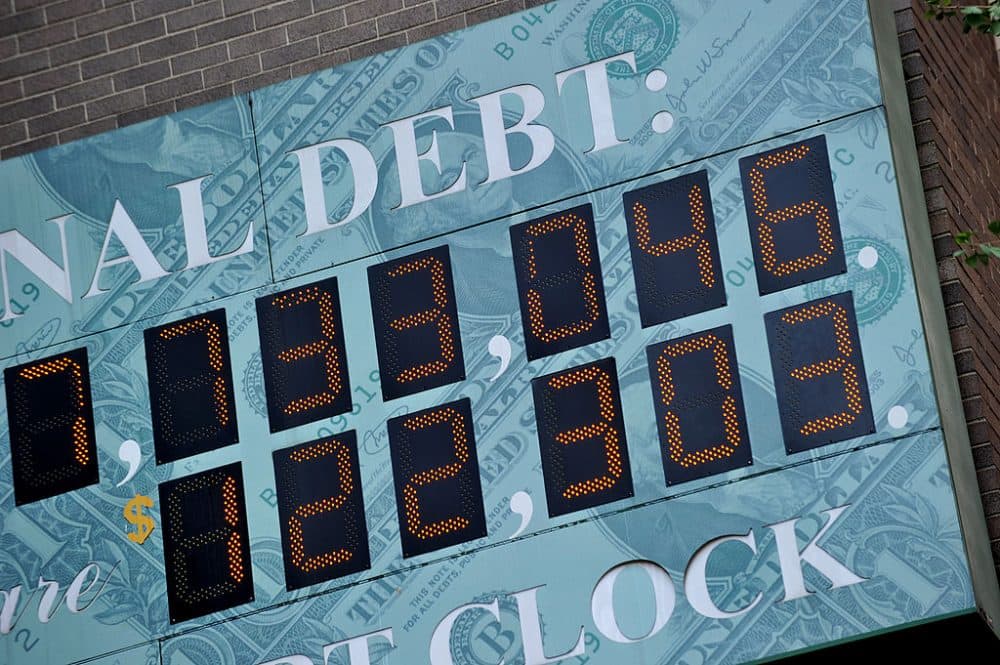Advertisement
The clock ticks on the debt limit: Lessons from America's last debt ceiling crisis
Resume
Sign up for the On Point newsletter here.
The U.S. debt limit clock is ticking.
A political stand-off in Washington on the U.S. debt limit is pushing the country perilously close to default.
In 2011, the country came within 72 hours of that happening.
Today, On Point: What’s the path forward? We hear lessons from America's last debt ceiling crisis.
Guests
Claudia Grisales, congressional correspondent for NPR.
Jason Furman, Aetna professor of the practice of economic policy at the Harvard Kennedy School. Spent eight years as a top economic advisor to President Barack Obama, including as deputy director of the National Economic Council during the 2011 debt ceiling negotiations.
Rohit Kumar, principal and co-leader of PwC’s National Tax Services practice. Former Domestic Policy Director and Deputy Chief of Staff for Senate Republican leader Mitch McConnell.
Also Featured
Laurence Tribe, Carl M. Loeb University Professor Emeritus at Harvard Law School.
Interview Highlights
On two positions on the debt limit
Claudia Grisales: "Where they started, they were really far apart. When you look at the beginning of the year, Biden and McCarthy had not even met. They had an initial meeting in February. And Biden said, I want to see your offer on spending, on the budget. Where do you want to start in terms of these talks, and where are House Republicans? Well, they didn't pass their bill with their partisan wish list on what kind of spending cuts, what kind of levels they would like to see over the next decade, and what programs could be rolled back, for example, such as unspent COVID relief dollars.
"And so that didn't come until towards the end of April. And so that gave the president and that gave House Speaker McCarthy a much tighter window to get together. So they spent weeks they spent months waffling back and forth in terms of one side not detailing enough for the other to start these negotiations. So, yes, they were very far apart. Now, we should also note this bill that was finally passed in April, it was called the Limit, Save, Grow Act. That's what Republicans called it.
"It would raise the debt ceiling by $1.5 trillion or until March of next year, whichever happens first. And just to show you how far apart both parties were. ... Democrats dubbed the same bill the Default on America Act or D.O.A. Act, signaling that it was not going anywhere. ... They called it a ransom note to the American people. So a really clear indicator in terms of how far apart they were even just going into this first major meeting yesterday."
In 2011, when Barack Obama was president, there were negotiations over the debt ceiling. The government came within 72 hours of default. How is this situation similar or different from 2011?
Claudia Grisales: "It is similar in that we're seeing divided government and we're seeing quite the standoff. And as you note, it came so close to the ceiling, you know, within days, within hours of that ceiling, the U.S. credit rating was downgraded for the first time for even getting that close. So it was very partisan. Now, two of the parties involved then are involved today. Biden is, then vice president. McConnell in the Senate, but they help broker this last-minute deal. The difference this time is, McConnell says I'm not a major player here, to President Biden. You need to negotiate with McCarthy.
"All the Republicans are lining up behind him. You need to agree to some cuts, some changes in terms of what their opening offer is with this Republican bill that they passed recently. But we're seeing both sides. These are much more partisan times since 2011, and both sides are very much more entrenched in their corners. McCarthy is a much less familiar opponent for Biden when it comes to negotiations. So, they're going to have to overcome a lot to get on the same page.
"And also, if we look at that House ... margin that House Republicans deal with, McCarthy passes partisan Wishlist by a vote of 217 to 215. I mean, by a matter of just less than a handful of votes. Now we have a House member, George Santos of New York, who has run into some legal troubles. We're not sure every vote counts. We're not sure. For example, members such as Santos, how they will play into another effort to pass another bill that would be more on a bipartisan basis to reach a deal between House Republicans, and President Biden could move through the House. The stakes are really high. It's a very high partisan situation here. So it's going to be a really, really tall order for everyone to try and reach agreement here."
On consequences of a debt ceiling crisis
Jason Furman: "There's a lot of uncertainty. And it also depends how you go over the debt limit and how long, if you go over for 2 hours, is calamity going to happen after 2 hours? Probably not. With each passing day, does the odds of something really bad go up? Yes. So, you know, are you on the first day going to shoot yourself in the toe or shoot yourself in the head? I'm not entirely sure, but I don't think we want to find out. We don't want to repeat that over and over again.
"And the reason this is so important is the largest and most liquid security in the entire world is U.S. Treasuries. They're incredibly safe, they're incredibly liquid, and they undergird everything else. The way banks function, the way, you know, financial transactions function, all operating through this medium. If that medium suddenly is no longer as safe and no longer as liquid. Really bad things can happen not just in the United States, but around the world."
Joe Biden led those negotiations for the White House back in 2011. What did he learn, and how does that influence how he's handling the crisis?
Jason Furman: "In 2011, ultimately the crisis was averted. The United States raised the debt limit, but it did it in a way that I think was terrible. The brinksmanship raised interest rates. They ultimately cost the federal government money, not a huge recession amount of money. But if Congress were to pass a law and say, let's collect billions of dollars, set them on fire on the mall, I don't think anyone would think that was a good idea, even if it didn't cause a recession.
"The stock market plunged. Our debt got downgraded by one of the three ratings agencies. And so President Obama looking at that said this is not something I want to repeat. We just can't have a process like this. Again, he shifted to a mode of, We're not going to do this, types of high stakes brinksmanship debt limit negotiation. And in his second term, he pretty much didn't. And the increases in the debt limit were routine without drama, and without all of the problems. And President Biden is taking that approach, the approach that worked successfully, I think, for the country as well as for President Obama in his second term and carrying it into his presidency."
On a long-term fix for averting debt crisis
Claudia Grisales: "In the past, when Democrats were in charge of the Senate and the House that did come up, this hope that there could be some sort of long-term solution. Of course, in the Senate, they did not have enough votes from Republicans. They still needed ten Republicans swing to their side if they were going to come up with some sort of permanent fix. And so if they couldn't do it, then it's going to be even harder now with divided government and these extreme wings of the House Republican Party. So there is that hope there. But it's a ways off in terms of when they could get there."
This program aired on May 10, 2023.

